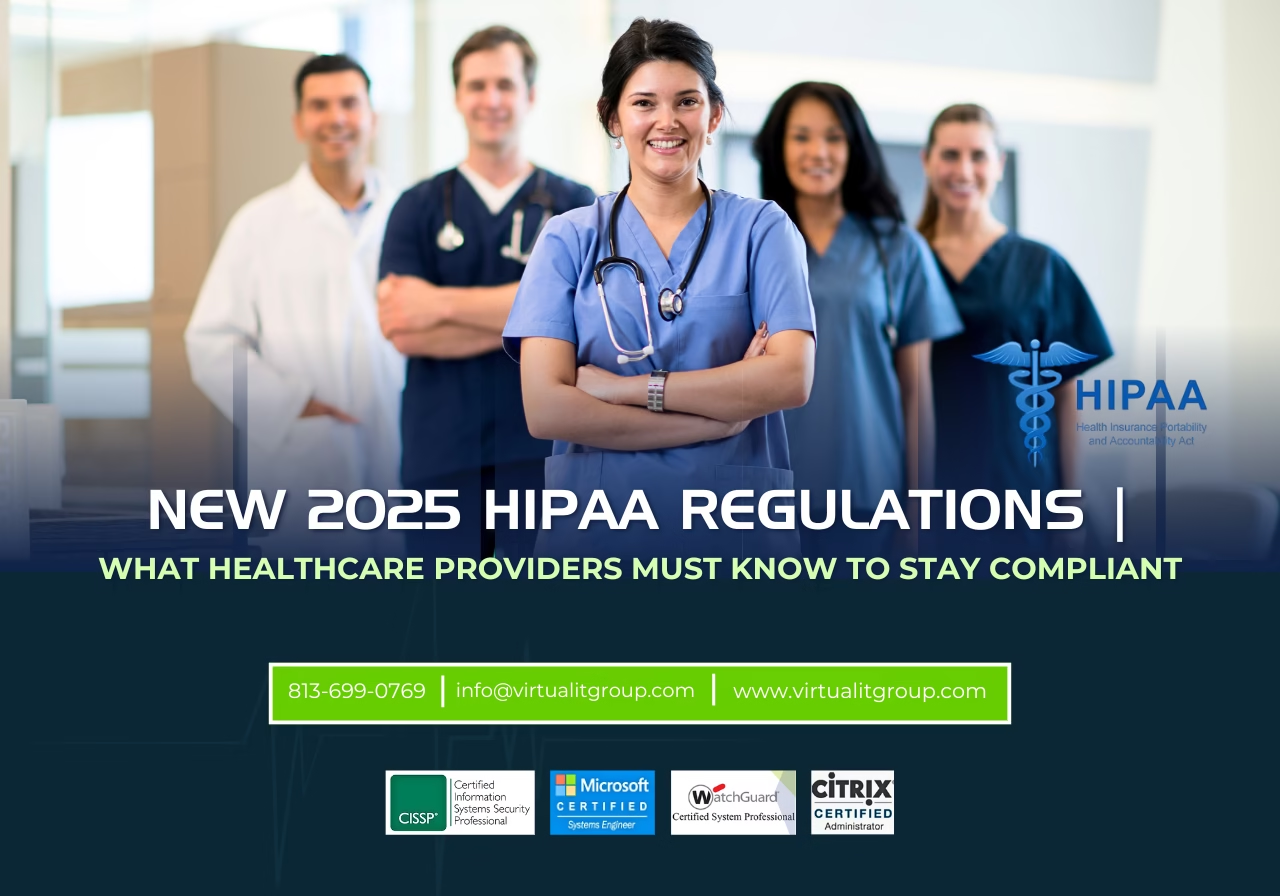The new 2025 HIPAA regulations are set to reshape the way healthcare providers manage patient privacy and data security. With the increasing shift towards digital healthcare systems, these regulations are designed to address the evolving cybersecurity challenges and ensure the continued protection of patient health information (PHI). These changes require healthcare organizations to stay proactive in updating their security protocols and compliance practices.
As technology continues to evolve, healthcare organizations must prepare for these updates to avoid potential penalties and data breaches. This article will help you understand the key changes in the 2025 HIPAA regulations and how to ensure your practice stays compliant.
What’s New in the 2025 HIPAA Regulations?
The 2025 HIPAA updates introduce several key changes aimed at enhancing the protection of patient data. These new rules mandate enhanced security protocols, faster breach notification timelines, and modern healthcare technology integration. As a healthcare provider, it’s crucial to stay informed about these updates to avoid penalties and breaches.
Key Changes in the 2025 HIPAA Regulations:
1. Stronger Privacy Protections & Enhanced Data Access
To comply with the 2025 HIPAA regulations, healthcare organizations must implement stronger encryption and multi-factor authentication (MFA) to secure electronic health records (EHRs) and other sensitive patient data. In addition, patients now have enhanced rights to access and share their data efficiently through Fast Healthcare Interoperability Resources (FHIR). These updates also support third-party integration with EHRs, improving patient-centered care and allowing data exchange between healthcare organizations.
2. Shortened Breach Notification Timeline
Under the 2025 HIPAA regulations, healthcare organizations are now required to notify patients about data breaches within 30 days—a drastic reduction from the previous 60-day notification period. If this timeline is missed, healthcare providers risk hefty penalties and reputational damage.
3. Increased Cybersecurity Requirements
The 2025 HIPAA updates require all healthcare providers to implement a Zero Trust security framework, which ensures that every access point to ePHI is verified before access is granted. Additionally, multi-factor authentication (MFA) is now mandatory across all systems that access sensitive patient information.
Enhancing Data Privacy for Healthcare Providers
The 2025 HIPAA regulations emphasize strengthening the protection of patient health information (PHI). Compliance requires healthcare organizations to encrypt and secure electronic health records (EHRs) and other forms of PHI. The new regulations also call for the use of encryption and multi-factor authentication (MFA) to ensure patient data remains confidential and protected even in the event of a breach.
For example, advanced encryption protocols must be applied to all transmitted data whether it’s exchanged between hospitals, doctor’s offices, or insurance companies to mitigate growing cyberattack risks. These updates aim to provide better protection against unauthorized access and data leaks.
Expanding Data Breach Notification Rules
The 2025 HIPAA regulations introduce a faster breach notification timeline. Providers must notify patients within 30 days of a breach. This shortened window ensures that healthcare organizations can quickly mitigate the impact of a breach on patients and protect them from further risks.
How to Prepare for the 2025 HIPAA Regulations
Healthcare organizations must act now to meet the 2025 HIPAA compliance requirements. By taking proactive steps and leveraging expert IT services, you can ensure compliance, protect patient data, and reduce your risk of penalties. Here’s how you can prepare:
How VITG Helps Healthcare Providers Stay Compliant
| Action | How VITG Helps |
|---|---|
| Conduct a Risk Assessment | At Virtual IT Group (VITG), we conduct comprehensive HIPAA risk assessments to identify potential gaps in your security infrastructure. We provide customized recommendations to strengthen your systems and ensure compliance with the 2025 HIPAA regulations. This includes assessing systems like M365 email, computers, and servers to ensure they meet the latest security standards. |
| Upgrade Your
Security Systems |
VITG offers 24/7 incident response and monitoring services for critical systems like M365 email, SharePoint, and OneDrive. Our MFA solutions and encryption services protect ePHI, ensuring your systems comply with the latest HIPAA standards. We also enhance the security of your computers and servers, ensuring your entire IT infrastructure is covered. |
| Revamp Employee Training | VITG provides HIPAA-compliant training programs and phishing simulations to ensure your team stays updated on the latest cybersecurity threats. Training your staff on secure email practices, data handling, and recognizing threats can help prevent security breaches. We focus on M365 email, a common entry point for cyberattacks, to ensure employees handle sensitive data appropriately. |
| Ensure Vendor Compliance | VITG helps review and strengthen your Business Associate Agreements (BAAs) with third-party vendors. We also conduct regular security audits to ensure vendors working with M365 email, computers, and servers meet the required security standards for HIPAA compliance. |
Common Security Gaps in Healthcare IT Infrastructure
As healthcare organizations move forward with implementing 2025 HIPAA regulations, it is important to identify common security gaps that may put patient data at risk. Some of the biggest vulnerabilities include:
1. Legacy IT Systems
Many healthcare organizations still rely on legacy systems, which may not meet the latest security standards. M365 email, computers, and servers must be regularly updated and patched to prevent cyberattacks that exploit these outdated systems. VITG ensures that all systems are compliant with current HIPAA regulations to avoid potential breaches.
2. Inadequate Encryption Practices
Without proper encryption, sensitive patient data is vulnerable to interception during transmission. Implementing end-to-end encryption for M365 email and other communications is critical in securing ePHI.
3. Lack of Multi-Factor Authentication (MFA)
MFA is now mandatory for accessing any ePHI. It adds an extra layer of protection, making it more difficult for unauthorized individuals to access sensitive information. VITG offers MFA solutions tailored to your business’s needs, ensuring compliance with 2025 HIPAA requirements.
How VITG Can Help Healthcare Organizations Stay Compliant
VITG provides comprehensive cybersecurity solutions designed to help healthcare providers stay ahead of the 2025 HIPAA regulations. Here’s how our services align with the new rules to help protect your practice:
24/7 Incident Response & Monitoring
We provide round-the-clock monitoring for your systems, including M365 email, SharePoint, and OneDrive, ensuring they remain compliant with the latest HIPAA security standards. Our proactive monitoring helps identify potential threats before they become issues.
Advanced Threat Detection & Zero Trust Networking
Our Managed MxDR service offers Advanced Threat Detection and Zero Trust Networking, ensuring ePHI is protected against evolving cyber threats. This service also integrates seamlessly with M365 email and your computers/servers for holistic protection.
Compliance with HIPAA Security Regulations
With Enterprise Password Manager, Privileged Access Management, and Security Information and Event Management (SIEM) solutions, VITG ensures that only authorized personnel can access sensitive patient data. Our SIEM 90-day retention service also helps organizations stay compliant with the new breach notification rules. We ensure M365 email, computers, and servers are all secure and compliant.
Employee Training & Awareness
We provide HIPAA-compliant training and phishing simulations to ensure your staff is well-equipped to recognize and prevent security threats. This training includes specialized content for handling sensitive data through M365 email and ensuring compliance in daily operations.
Ongoing Adaptation to New HIPAA Regulations
In addition to addressing the immediate requirements of the 2025 HIPAA regulations, healthcare organizations must also consider how to adapt to future changes. Technology and healthcare regulations are continuously evolving, and staying ahead of potential updates will help safeguard against data breaches and compliance violations.
1. Proactive Updates and System Integrations
As the healthcare sector continues to digitize, integrating new technologies such as cloud computing, big data analysis, and artificial intelligence will become increasingly important. VITG ensures your IT infrastructure evolves with these advancements, maintaining compliance and protecting your data.
2. Regular Security Audits
Ongoing security audits are essential to ensure that your systems remain compliant as your infrastructure evolves. With VITG’s IT services, regular audits help identify vulnerabilities, address potential risks, and ensure that your business is always prepared for evolving cybersecurity threats.
Conclusion
Navigating the complexities of the 2025 HIPAA regulations is a critical task for healthcare organizations. VITG provides the expertise and resources needed to help your practice stay compliant and secure. From risk assessments and advanced cybersecurity measures to employee training and real-time support, our managed IT services ensure that your practice is always one step ahead of the regulations.
Don’t wait for a breach to happen, act now! Visit www.virtualitgroup.com or maximize our web chat for immediate support and expert guidance on how to meet the 2025 HIPAA compliance requirements.
Frequently Asked Questions (FAQs)
What are the key updates in the 2025 HIPAA regulations?
The 2025 HIPAA updates introduce several critical changes, including:
- Stronger privacy protections, ensuring more robust encryption and multi-factor authentication (MFA) for systems accessing ePHI.
- A shortened breach notification timeline, requiring healthcare organizations to inform patients of a breach within 30 days.
- Mandatory implementation of Zero Trust security frameworks, and other cybersecurity measures to protect ePHI.
How can healthcare providers ensure they are compliant with the 2025 updates?
To stay compliant with the 2025 HIPAA regulations, healthcare organizations should:
- Conduct regular risk assessments to identify vulnerabilities in their IT systems.
- Upgrade security systems to meet the latest encryption standards and implement MFA across all systems accessing ePHI.
- Revamp employee training to ensure that staff are aware of new compliance guidelines and security protocols.
- Review and strengthen Business Associate Agreements (BAAs) with third-party vendors to ensure compliance.
What penalties can healthcare organizations face for non-compliance with the 2025 regulations?
Non-compliance with the 2025 HIPAA regulations can lead to:
- Heavy fines, ranging from $100 to $50,000 per violation.
- Civil penalties and potential criminal charges for intentional violations.
- Reputational damage, which can result in loss of patient trust.
- Potential legal action from affected individuals.
How does encryption play a role in the new HIPAA regulations?
Encryption is essential in protecting electronic health information (ePHI). The 2025 HIPAA regulations mandate that healthcare organizations:
- Encrypt all transmitted ePHI, whether between healthcare providers, insurance companies, or patients.
- Ensure that ePHI is encrypted at rest and in transit to prevent unauthorized access.
- Apply advanced encryption protocols for securing sensitive patient data, minimizing the risk of data breaches.
How often should healthcare providers conduct risk assessments?
Healthcare organizations should conduct risk assessments regularly, at least annually, and anytime there is:
- A change in IT infrastructure, such as the addition of new systems or software.
- An upgrade to systems or a change in how ePHI is handled.
- The addition of new third-party vendors that interact with sensitive patient data.
- Security incidents or breaches should prompt an immediate assessment to ensure vulnerabilities are identified and fixed.
What is the deadline for notifying patients about a data breach under the new rules?
Under the 2025 HIPAA regulations, healthcare providers must notify affected patients about a data breach within 30 days of discovering the breach.
Failure to meet this 30-day deadline can result in significant penalties, both financially and reputationally.
How can healthcare organizations protect patient data from cyberattacks under the 2025 regulations?
To protect patient data from cyberattacks, healthcare organizations should:
- Implement Zero Trust security models to verify all access points to ePHI.
- Ensure that all systems accessing ePHI, including email and cloud storage, are secured with multi-factor authentication (MFA).
- Conduct regular vulnerability scans and security audits to detect and mitigate risks.
- Use encryption to protect ePHI both in transit and at rest.
- Provide employee training to help staff recognize phishing attempts and other social engineering tactics.
What steps should healthcare providers take to comply with new cybersecurity mandates?
Healthcare providers must take several steps to comply with the new cybersecurity mandates, including:
- Adopting Zero Trust security models across all systems.
- Ensuring all devices and users accessing ePHI are authenticated and authorized before granting access.
- Implementing network segmentation to limit exposure in the event of a cyberattack.
- Using advanced antivirus and anti-malware tools to prevent cyber threats from affecting patient data.
- Keeping software and systems up to date with the latest security patches.
How can VITG help healthcare providers meet the 2025 HIPAA regulations?
VITG specializes in providing HIPAA-compliant IT services for healthcare providers. We offer:
- Comprehensive risk assessments to help identify potential compliance gaps.
- 24/7 monitoring services for systems like M365 email, SharePoint, and OneDrive to ensure your infrastructure is secure.
- MFA and encryption solutions to protect ePHI.
- Regular security audits to ensure compliance with the latest HIPAA regulations.
- HIPAA-compliant training programs to help your staff stay updated on cybersecurity best practices.
- Custom IT solutions tailored to your unique needs, helping your practice meet regulatory requirements while improving operational efficiency.
Can VITG help my practice improve its cybersecurity posture?
Yes, VITG offers a full suite of cybersecurity solutions designed to help healthcare organizations improve their security posture. These include:
- Advanced threat detection through Managed XDR (MXDR) services.
- Zero Trust Network Access (ZTNA) to ensure all devices are verified before accessing your network.
- Cloud-based security solutions to protect your data from breaches, even in remote work environments.
- Data loss prevention measures to safeguard against the accidental or intentional leakage of sensitive data.
What are the most common security risks for healthcare organizations?
- Healthcare organizations face numerous security risks, including:
- Ransomware attacks targeting healthcare data, causing operational disruptions.
- Phishing attacks targeting healthcare workers to steal login credentials and access patient data.
- Insider threats, where employees may inadvertently or maliciously compromise sensitive data.
- Unpatched systems that leave vulnerabilities open to exploitation.
By partnering with VITG, you can minimize these risks through proactive monitoring, encryption, and comprehensive IT support.
What happens if we don’t comply with the 2025 HIPAA regulations?
Failure to comply with the 2025 HIPAA regulations can lead to:
- Fines and penalties, which can be as high as $50,000 per violation.
- Reputation damage, which can affect your relationships with patients and healthcare partners.
- Legal consequences, including potential lawsuits from patients whose data was compromised.
By working with VITG, your organization can avoid these risks by ensuring compliance with the latest regulations.
Are there any benefits to using managed IT services for HIPAA compliance?
Yes, managed IT services provide many benefits for HIPAA compliance, including:
- 24/7 monitoring and incident response to catch and resolve issues before they become breaches.
- Access to specialized cybersecurity experts who understand the unique compliance requirements for healthcare organizations.
- Proactive maintenance to prevent security issues before they happen.
- Scalable IT solutions to support your organization’s growth and changing needs.
How do the 2025 HIPAA regulations affect healthcare organizations’ IT infrastructure?
The 2025 HIPAA regulations place new demands on healthcare organizations’ IT infrastructure, requiring:
- Enhanced security protocols like Zero Trust networking and multi-factor authentication (MFA) to protect sensitive patient data.
- Stronger encryption for transmitted data, particularly Electronic Health Records (EHRs) and other ePHI.
- Scalability to accommodate growing IT needs as organizations expand their use of technology and digital systems.
Healthcare organizations will need to invest in upgraded IT systems and proactive IT management to meet these evolving requirements.
What is the significance of MFA (Multi-Factor Authentication) in HIPAA compliance?
Multi-Factor Authentication (MFA) plays a crucial role in ensuring that only authorized users can access sensitive health data. It adds an extra layer of security by requiring users to provide two or more verification factors—such as a password and a biometric scan or authentication code—before granting access to ePHI.
The 2025 HIPAA regulations mandate the use of MFA across all systems that store or access ePHI, ensuring that even if login credentials are compromised, unauthorized access is still blocked.
How can VITG help me ensure compliance with new 2025 HIPAA breach notification rules?
VITG helps your organization comply with the updated breach notification rules by:
- Monitoring systems for potential breaches, alerting you in real-time if there is a security threat to ePHI.
- Implementing automated breach detection tools and protocols to catch potential breaches before they escalate.
- Assisting with the documentation and reporting of breaches, ensuring that notifications are sent to patients within the 30-day timeline.
- Providing ongoing training to staff on data protection practices and breach response procedures.




